初中介词讲解
初中语法大全讲解--介词
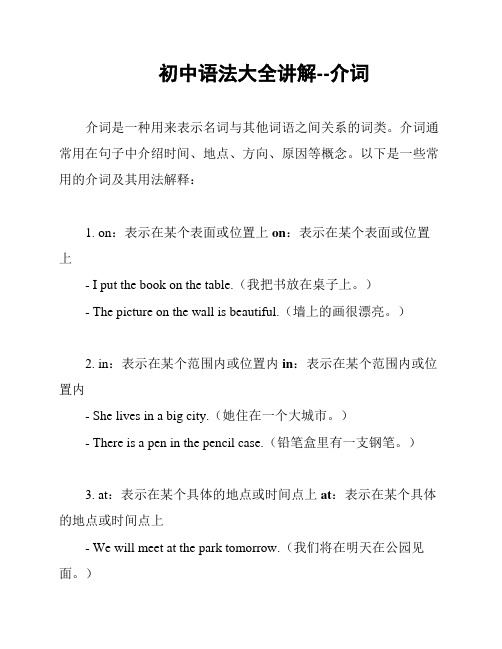
初中语法大全讲解--介词介词是一种用来表示名词与其他词语之间关系的词类。
介词通常用在句子中介绍时间、地点、方向、原因等概念。
以下是一些常用的介词及其用法解释:1. on:表示在某个表面或位置上on:表示在某个表面或位置上- I put the book on the table.(我把书放在桌子上。
)- The picture on the wall is beautiful.(墙上的画很漂亮。
)2. in:表示在某个范围内或位置内in:表示在某个范围内或位置内- She lives in a big city.(她住在一个大城市。
)- There is a pen in the pencil case.(铅笔盒里有一支钢笔。
)3. at:表示在某个具体的地点或时间点上at:表示在某个具体的地点或时间点上- We will meet at the park tomorrow.(我们将在明天在公园见面。
)- He is waiting for you at the front door.(他在门口等你。
)4. to:表示朝向某个目标或对象to:表示朝向某个目标或对象- She walked to school.(她走向学校。
)- Can you pass the book to me?(你能把书递给我吗?)5. with:表示伴随或使用某个工具或对象with:表示伴随或使用某个工具或对象- I went to the park with my friends.(我和我的朋友一起去了公园。
)- He wrote the letter with a pen.(他用钢笔写了这封信。
)6. by:表示通过某种方式或交通工具by:表示通过某种方式或交通工具- We usually go to school by bus.(我们通常坐公交车去学校。
)- She sent the gift by mail.(她通过邮寄发送了礼物。
初中英语中考语法知识介词分类讲解(共18类)

中考英语介词分类讲解一、表示方位in:在某块更大地域的内部on:两块地接壤, 挨着to:两块地不接壤, 中间隔着【例】上海位于中国的东部.Shanghai is in the east of China.(上海是中国境内的一座城市, 处于中国内部)广东在广西的东南边.Guangdong is on the southeast of Guangxi.(广东与广西挨着, 两块地域相邻)台湾在福建省的东南面.Taiwan is to the southeast of Fujian.(台湾与福建隔海相望, 中间并不接壤, 隔得较远)east东south南west西north北①以上4个方位词既是名词(n.),又是副词(adv.)②两两组合, 就可以组成:东南southeast、东北northeast、西南southwest、西北southnorth另4个方向.【例】向西走用名词:go to the west(west属于特指, 前面必须加定冠词the)所有特指的名词前面都要加the, 比如太阳☀️只有一个, 使用时-the Sun, 同理月亮 -theMoongo是不及物动词(vi),后面跟名词必须要加介词to(不清楚及物动词/不及物动词的小伙伴, 请跳转 :【笔记】英语语法入门到精通(17)| 动词之:及物动词&不及物动词)用副词:go west(这里副词west修饰动词go)【例】向西走10米.go west/ go to the west ___ 10 meters.根据之前的结构判断原则, 10米属于名词, 前面的结构是完整的, 只不过省略了主语.go west是谓语+adv.,这里可以看成是主谓+adv., 结构完整.go to the west中, go是谓语, 介词to和名词the west共同构成介词短语, 整体也可看成主谓+介词短语, 结构完整.剩下的10meters是名词, 而完整的句子结构后面只能是adv./介词短语, 因此空行里一定是介词.答案:go west/ go to the west for 10 meters.二、表示上下↑在....上:over、above、on↓在....下:beneath、under、below①正上-正下:over-underover还有覆盖在某物体上面的意思, 也属于接触面, 但注意和on的区别, on只表示在物体表面, 没有覆盖的意思.②非正上-非正下:above-below不强调正上方/正下方时, 只要是上/下方都可以用.③表面上-表面下:on-beneath【例】你头顶正上方有一幅画.There is a painting over your head.树下面有一只大象 .There is an elephant under the tree.树上有很多苹果.There are many apples on the tree.(苹果是长在树上 的, 属于接触表面)地下有很多文物.There are a lot of antiques beneath the ground.(也可以用underground一个词表示“地下”)飞机 在云层上飞行.The plane flew above the clouds.气球在房子 上方10米处.A balloon is 10 meters above the house.(可以加具体数量词精确描述)请把你的名字写在下面.Please write your name below.三、表示前后前:in (the)front of/before后:in/at(the)back of/behind【例】那辆车在我的后面.The car is in back of me.The car is at back of me.The car is behind me.(更常用这句)我们在这座雕像前拍照吧.Let's take a photo in front of/before the statue.他坐在教室里的前面.He sits in the front of the classroom.他坐在车里的后面.He sits in the back of the car.He sits at the back of the car.四、表示附近/周围周围:around附近:near旁边:by/beside/next to【例】我手边有一支笔.There is a pen next to/beside my hand.电话在窗户旁边.The telephone is by the window.书在柜子边.The book is beside the cabinet.小狗绕着我跑.The dog ran around me.老师住在我家附近.My teacher lives near my home.五、表示中间两者之间:between在许多东西中间(3个及以上):among在许多东西的正中间(3个及以上):in the middle of【例】他坐在我和Tom的中间.He sits between me and Tom.他们在人群中行走.They walked among the crowds.他在那群人中很优秀.He is outstanding among those people.他正站在人群的正中央.He is standing in the middle of the crowd.六、表示穿越/穿过横穿:across(随随便便地穿过去)从物体内部穿过:through(水从水管流过)从物体上方穿过:over(跨栏杆)从物体旁边穿过:pass/by【例】这条小路穿过一片树林.The path goes through a wood.(小路是从树林里穿过)透过这扇窗, 你能看到一座教堂.Through the window, you can see a church.(through还可以表示目光穿过)我能隔墙听到他们交谈.I can hear their talk through the wall.(through还可以表示透过...听到声音)你穿过这道大门, 就看到左面的房子了.Go through this gate, and you'll see the house on your left.(人走过大门, 也是内部穿过)( 注意:这句话由2个简单句组成,中间逗号隔开, 并用and连接)他独自一人穿越了沙漠.He went across the desert alone.(alone这里做副词)飞机飞过了一座城市.The plane flew(fly过去式) over a city.他跳过了篱笆.He jumped over the fence.我经过了你的家.I passed your home.七、instead / instead of表示代替/而是instead-副词(adv.)instead of-介词【例】他没买手机, 而是买了电脑.① He didn't buy a phone instead of buying a laptop.(1句话)instead of是介词, 后面原本要加名词, 但buy是动词, 放在介词后面要变成ing形式(即动词+ing做为名词成分, 属于非谓语动词的一种, 后面会细讲, 记得关注哦~)句子结构分析:He didn't buy a phone.是一套完整的主谓宾,后面可以直接加介词短语/副词, instead of 是介词, 后面要加名词, 把动词buy变ing形式, 变成名词.② He didn't buy a phone.He bought a laptop instead.(2个简单句)同理, 前后2句都是完整的主谓宾,instead是副词, 原句意是买电脑替代了原本要买的手机, 所以instead放在第2句里.洗淋浴吧, 别用浴缸了.Take a shower instead of a bath.Don't use the bath.Take a shower instead.八、according to / based onaccording to根据based on以...为基础2个都是介词短语, 在句子里前后都能放.【例】据迈克说, 这是一部很棒的电影.According to Mike, it's a great movie.(放句首要用逗号隔开)根据我的经验, 明天会下雪.It will snow tomorrow according to my experience.(不放句首时不用逗号隔开)本书是根据个人经历写成的.The book is based on personal experience.九、besides / except /except for /apart from表示除了...注意区别:besides如果去掉s,就是beside在...旁边besides-表示除了, 还...., 包括“除了”的那部分, 比如:除了喜欢吃香蕉 , 还喜欢吃苹果.两者仍然都属于“喜欢吃”的范围内.except-仅表示除了...之外, 排除意味更明显.except for-用法同except, 但更强调美中不足的那部分.apart from-besides和except的用法都可以用.【例】除了周末我们每天都工作.We work every day except/apart from weekend.(把周末排除在外)除足球外你还喜欢哪些运动?What other sports do you like besides football?(除了喜欢...还喜欢....)除了英语, 我还喜欢数学.I like math besides/apart from English.你英语很好, 除了一些语法错误.Your English is good except for some grammar mistakes.(美中不足)十、ahead of表示在...前面①不同于03部分的方位介词, ahead of的“前面”更宽泛:方位/时间(提前)/能力(优秀)/名次(领先)...② ahead of前面可以加数量词修饰.【例】有两只猫在我们前面.Two cats are ahead of us.(表示方位,可与 03部分的方位词替换)我在最后期限之前完成了作业.I finished homework ahead of the deadline.我们提前15分钟完成了测验.We finished test 15 minutes(数量/时间) ahead of time.她前程远大.She has a great future ahead of her.(a great表示数量多,程度深)她总是遥遥领先班上的同学.She was always(adv.做状语) ahead of her classmates.十一、as for 表示至于...【例】至于作业, 我明天会完成.As for my homework, I will finish it tomorrow.至于这封信, 我交给他了.As for this letter, I gave it to him.至于其他人, 回家吧.As for the others, go home.十二、of/about/on表示关于...of-比较浅显地提及, 聊到, 顺带提一嘴的感觉about-比of稍深入一点, 日常使用on-比较正式介绍时使用, 偏专业【例】昨天晚上他没有提起他妈妈.He didn't talk about his mother last night.他们谈到即将到来的圣诞节.They talk of the coming Christmas.我没有想(考虑)到成本.I don't think of the cost.我得思考一下这件事.I have to think about this thing.这是一本关于历史的书.This is a book on history.十三、like 表示像...like有2种词性:①表示喜欢时, like是动词【例】我喜欢香蕉和苹果.I(主) like(谓) banana and apple(宾).②表示像...时, like是介词,后面+n./doing(动词的名词形式)/从句.【例】我不喜欢像Tom这样的人.I don't like people like Tom.(第一个like是动词, 第二个是介词)她好像我妈妈.She is like my mother.如果“好像”前面没有主语, 用It's like(that)...., that可加可不加.It's not like...(不像.../跟...不一样)【例】好像她说的是真的.It's like (that) what she said is true.好像是他拿走了我的书.It's like (that) he took my book.你并不爱她.It's not like you love her.和上次不一样.It's not like last time.跟我3年前看到的不一样.It's not like what I saw 3 years ago.十四、as 表示当作...as这里作为介词,表示当作..., 中文意思里和like表示像...相近, 但as的所谓“像”的程度比like更深, 甚至可以理解为"就是...(通常是职业或身份)", 而like仅仅是“相像”.【例】她把我当做朋友一样.She treats me as a friend.(像对待朋友一样对待“我”)你可以把那个玻璃杯当作花瓶用.You can use that glass as a vase.他工作起来像个警察.He works as a police.(几乎就是警察)He works like a police.(只是像, 但并不等于就是警察)十五、in exchange/return/reward for...表示作为....的交换/回报/奖励① in exchange for-作为...的交换【例】我用我的照相机交换他的DVD.I gave him my camera in exchange for his DVD.② in return for-作为...的报答【例】为了报答他的帮助,我给他送了份礼物.I gave him a present in return for his help.③ in reward for-作为...的奖励【例】他因勇敢获得了钱.He received money in reward for his bravery.【英语语法笔记(30)】介词(三):表示“原因”的介词大汇总十六、表示原因-Because of(because是连词, 加上of变成了介词)-Due to通常放在句首, 引导一个简单句子或复合句中的从句.它们的语气比较中性, 不会带有太多情感色彩.【例】因为下雨, 他迟到了.Because of the rain, he was late.由于天气炎热, 他决定待在家里.Due to the hot weather, he decided to stay home.-As a result of 作为...的结果表示结果或影响, 通常放在句子的开头或结尾, 引导一个简单句子或复合句中的从句.它的语气比较正式, 有时带有一定的客观性.【例】她因受伤而死亡.She died as a result of her injuries.由于雾太大, 所有航班都延误了.As a result of the heavy fog, all flights have been delayed.-On account of-Owing to表示"由于", 语气比较正式、书面化, 常见于正式文体中.【例】由于天气不好,飞机延迟了.The flight was late on account of the bad weather.The flight was late owing to the bad weather.注意:以上 这些表示原因的词组都属于介词, 后面要加名词/代词/动名词(后2个都相当于名词)十七、thanks to...多亏了...thanks to也有表示原因的意味.【例】多亏了你的帮助, 我才能按时完成项目.Thanks to your help, I was able to finish the project on time.多亏了你, 我们才能出国.Thanks to you, we can go abroad.多亏了你, 现在大家都知道了!Everyone knows about it now, thanks to you!(这句话更贴近咱中文“正话反说”, 或有点儿讽刺意味的那种感觉)十八、for/at/from/of/with/by/out of/through表示原因-for:表示某事发生的原因, 常用于解释某种行为或结果.【例】我对我的错误感到很抱歉.I'm sorry for my mistake.他为迟到道歉.He apologized for being late.-at:表示某个事件A/状态是导致某事B发生的原因.【例】他粗鲁的行为让她生气.She was angry at his rude behavior.Tom的妈妈对Tom的成绩感到很惊讶.Tom's mother was surprised at Tom‘s grades.-from:强调事件发生是源于外部原因-of:强调事件发生是源于内部原因【例】他死于车祸.He died from a car accident.他死于饥饿.He died of starvation.(这里原句可以理解为:他死了, 是因为某个原因, 前半句是个完整句子, 后面加上介词短语表示“原因”)-with:因情绪导致某事或某种状态发生.【例】他激动地大叫.He yelled with excitement.他气得发抖.He shivered with anger.(anger是angry(a.)的名词)-by:通常用by mistake(搞错了)/by chance(偶然)/by accident(意外)【例】他错误地删除了文件.His deleted the file by mistake.警方误抓了他.He has been arrested by mistake.我碰巧在机场遇见她.I met her by chance at the airport.我看见这封信纯属偶然.I saw the letter purely by chance.她碰巧发现了这个问题.She discovered the problem by accident.这不是偶然.It doesn't happen by accident.-out of:表示出于...原因【例】她接受这份工作是出于必要.She took the job out of necessity.他只是出于兴趣做的这份工作.He did this job just out of interest.-through:表示通过...获得结果【例】公司通过创新和辛勤工作取得了成功.The company achieved success through innovation and hard work. 病人通过物理治疗恢复了健康.The patient recovered through a physical therapy.。
初中英语 介词讲解

介词一、概述介词一般置于名词之前,它常和名词或名词性词语构成介词短语。
同一个介词常和不同的词语搭配形成固定搭配,表示不同意义。
根据介词本身的意义,可将介词分为时间介词、方位介词、动向介词、方式介词、原因介词等(见下表)。
二、常用介词的基本用法at1)表示具体的时间点:I go to school at seven every day 我每天早上7点去上学。
2)表示一段较短的时间:at night 在夜晚at Christmas 在圣诞节3)表示在某一具体地点:He is standing at the bus stop 他站在公共汽车站。
4)表示动作的方向、目标:Let me have a look at the picture 让我看看这幅图。
5)表示人的年龄:at the age of six 在六岁6)用于某些固定搭配:at once 立刻、马上at last 最后at the same time 同时at first 开始时not at all 一点也不about1)表示大约时间:It’s about six o’clock now. 现在大约6点钟了。
2)表示地点;在……周围:She is somewhere about the office. 她在办公室附近。
3)关于,对于:We are talking about the news. 我们正在谈论新闻。
after1)在……之后:After dinner I watch TV. 晚饭后我看电视。
2)在……后面:He came into the room after me. 他在我后面进了房间。
3)after+某个时间,表示从过去某个时间起过多长时间,多用于过去时,如:She left on Sunday and returned after three days.behind1)在……之后:There is a bike behind the tree. 树后有一辆自行车2)比……晚,迟于:The train is behind time. 火车晚点了by1)在……旁:He is sitting by the bed. 他正坐在床边。
初中英语语法专题—介词讲解
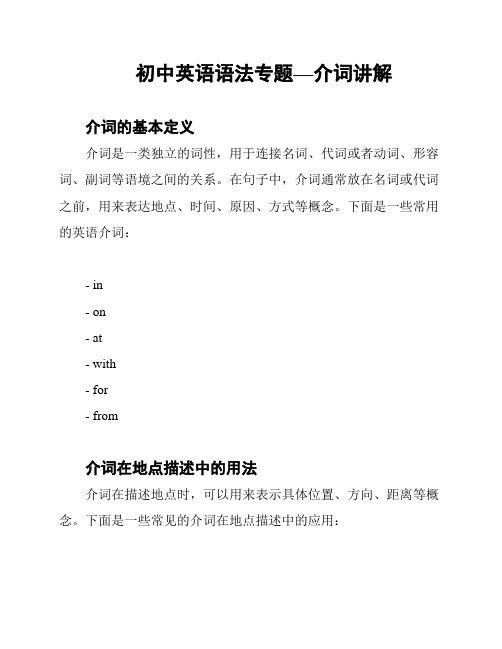
初中英语语法专题—介词讲解介词的基本定义介词是一类独立的词性,用于连接名词、代词或者动词、形容词、副词等语境之间的关系。
在句子中,介词通常放在名词或代词之前,用来表达地点、时间、原因、方式等概念。
下面是一些常用的英语介词:- in- on- at- with- for- from介词在地点描述中的用法介词在描述地点时,可以用来表示具体位置、方向、距离等概念。
下面是一些常见的介词在地点描述中的应用:- in:用于表示在某个范围之内的位置,例如 "in the room"(在房间里),"in the park"(在公园里)。
- on:用于表示在表面、平台或者位置上的状态,例如 "on the table"(在桌子上),"on the bus"(在公交车上)。
- at:用于表示在某个具体位置或者地点,例如 "at the cinema"(在电影院),"at school"(在学校)。
- to:用于表示朝向某个位置的移动,例如 "go to the park"(去公园)。
介词在时间描述中的用法介词在描述时间时,可以用来表示具体时间、时间段等概念。
下面是一些常见的介词在时间描述中的应用:- at:用于表示具体的时间点,例如 "at 7 o'clock"(在7点钟)。
- on:用于表示具体的日期或者星期几,例如 "on Monday"(星期一),"on January 1st"(1月1日)。
- in:用于表示较长的时间段或者某一个时间段内,例如 "inthe morning"(早上),"in July"(在七月)。
介词在原因描述中的用法介词在描述原因时,可以用来表示某事的起因或者原因。
初中英语知识点归纳介词的用法
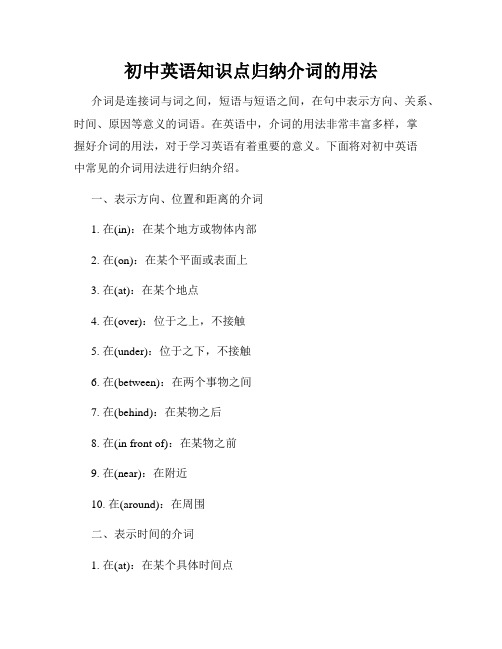
初中英语知识点归纳介词的用法介词是连接词与词之间,短语与短语之间,在句中表示方向、关系、时间、原因等意义的词语。
在英语中,介词的用法非常丰富多样,掌握好介词的用法,对于学习英语有着重要的意义。
下面将对初中英语中常见的介词用法进行归纳介绍。
一、表示方向、位置和距离的介词1. 在(in):在某个地方或物体内部2. 在(on):在某个平面或表面上3. 在(at):在某个地点4. 在(over):位于之上,不接触5. 在(under):位于之下,不接触6. 在(between):在两个事物之间7. 在(behind):在某物之后8. 在(in front of):在某物之前9. 在(near):在附近10. 在(around):在周围二、表示时间的介词1. 在(at):在某个具体时间点2. 在(in):在某个时间段3. 在(on):在某个具体日期三、表示原因的介词1. 因为(of):表示原因、缘故2. 由于(because of):表示原因、由于四、表示目的、用途和方式的介词1. 为了(in order to):表示目的2. 以便(in order that):表示目的3. 用(with):表示使用的手段或工具4. 通过(by):表示方式、方法5. 以(for):表示目的五、表示比较的介词1. 比较起见(than):表示比较的对象2. 和(with):与某人或某物在一起六、其它常见的介词1. 关于(about):表示涉及某一话题2. 靠(by):表示接近某人或某物3. 经过(through):表示通过某地或某事4. 编写(at):表示在某地工作或活动5. 因(as):表示角色、身份6. 例如(for example):表示举例7. 包括(including):表示包含某物以上是初中英语中常见的介词用法的归纳总结。
熟练掌握这些介词的用法,对于构建正确的句子和语法结构非常重要。
希望能对你的学习有所帮助。
初中英语语法全解——介词(共21张PPT)

6.across, through, past, over, along, down across表示从物体表面横穿;through表示穿过 空间;past表示从某物的一旁经过;over表示从 一边到另一边;along/down表示“沿着”。 John is going to swim across the river tomorrow. She smiled at him as he walked through the door. Walk down the road.
9.as as可以表示“像、按照”,也可以表示“作为”。 You ought to do as the teacher tells you. 10.against against表示“反对”。 There are 10 votes for him and only 2 against him.
Hale Waihona Puke 5.like like表示“像”。 Her hair is dark brown like mine. 6.with with可以表示“和......一起”,也可以表示“带 有”,还可以表示行为方式等。 She came back with a letter in her hand.
7.without without表示“没有,无”。 He found the place without difficulty. 8.for for可以表示目的,也可以表示原因。 I look after the kids for them.
5.before, after ①before后接时间点,表示“在某个时间之前”。 Must I finish my homework before supper? ②after后节时间点,表示“在某个时间之后”。 I go swimming every day after work.
初中介词的用法归纳

初中介词的用法归纳一、关键信息项1、介词的定义及分类2、常见介词的用法及示例3、介词与动词、形容词的搭配4、介词短语在句中的作用5、易混淆介词的辨析6、中考中对介词的考查重点及题型11 介词的定义介词是一种虚词,用来表示名词、代词等与句中其他词的关系,在句中不能单独作句子成分。
111 介词的分类1、时间介词,如 at、in、on 等。
2、地点介词,如 at、in、on、under、behind 等。
3、方式介词,如 by、with、in 等。
4、其他介词,如 for、of、to 等。
12 常见介词的用法及示例121 at 的用法1、表示在具体的时刻,如 at six o'clock。
2、表示在较小的地点,如 at the bus stop。
122 in 的用法1、表示在较长的时间段,如 in the morning。
2、表示在较大的地点,如 in Beijing。
123 on 的用法1、表示在具体的某一天,如 on Monday。
2、表示在物体的表面,如 on the table。
13 介词与动词、形容词的搭配131 与动词的搭配例如,look at(看)、listen to(听)、arrive in/at(到达)等。
132 与形容词的搭配例如,be interested in(对感兴趣)、be good at(擅长)等。
14 介词短语在句中的作用141 作定语如,The girl in red is my sister (in red 作定语修饰 girl)142 作状语如,He studies hard at night (at night 作状语)143 作表语如,He is in the classroom (in the classroom 作表语)15 易混淆介词的辨析151 in 和 onin 表示在里面,on 表示在上面。
152 at 和 inat 表示在较小的地点,in 表示在较大的地点。
[全]中考初中英语考点详解:介词
![[全]中考初中英语考点详解:介词](https://img.taocdn.com/s3/m/8700c70002d8ce2f0066f5335a8102d276a261da.png)
中考初中英语考点详解:介词1.介词的分类及功能介词是一种用来表示词与词、词与句之间关系的词。
介词是虚词,一般不重读,不在句子中单独作成分,需要和它后面的词共同充当句子成分。
一介词的分类1根据介词的构成分类根据介词的构成形式,可将介词分为简单介词、合成介词、双重介词、短语介词四类。
(1)简单介词简单介词指的是由一个单词构成的介词。
Both my parents were born in 1970.我的父母都出生于1970年。
Whom are you taking the mobile phone to? 你要把这部手机带给谁?(2)合成介词合成介词指的是由两个词合在一起构成的介词。
He traveled throughout Europe in his twenties.在二十多岁时,他游历了整个欧洲。
I couldn’t see his face—he had his back towards me. (表示方向)我看不见他的脸——他背对着我。
(3)双重介词双重介词指的是由两个介词组成的介词。
I can take up to four people in my car.我的小汽车最多能坐4个人。
The moon finally appeared from behind the clouds.月亮终于从云后露了出来。
(4)短语介词短语介词由一个或几个简单介词和一个或几个其他词类组合构成,其作用只相当于一个介词。
Except for a broken bed,the room is empty.除了一张破旧的床,这个房间是空的。
Who are the boy and the girl in front of you?你前面的男孩和女孩是谁?提示短语介词是一个相当于简单介词的短语,不能单独使用,其后需加宾语。
而介词短语是由介词后加宾语构成,可以单独作句子成分。
2根据介词的意义分类根据介词的意义,可将介词分为表示时间的介词、表示空间(地点)的介词、表示原因(目的)的介词、表示让步的介词、表示方式(手段)的介词和其他介词。
初中英语:介词及介词短语,考点详解
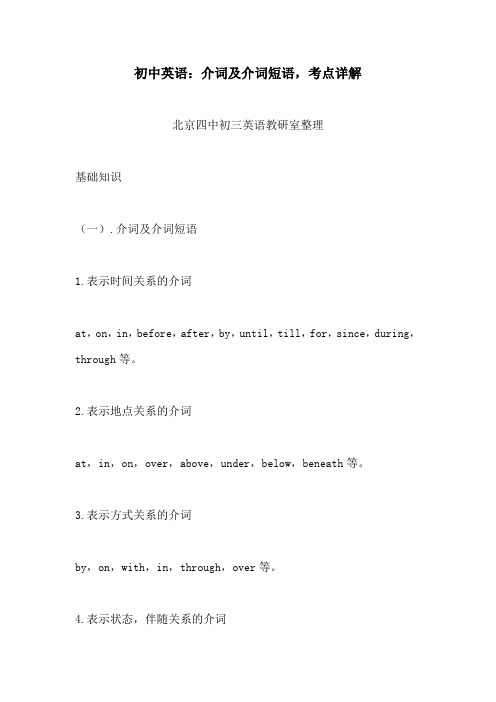
初中英语:介词及介词短语,考点详解北京四中初三英语教研室整理基础知识(一).介词及介词短语1.表示时间关系的介词at,on,in,before,after,by,until,till,for,since,during,through等。
2.表示地点关系的介词at,in,on,over,above,under,below,beneath等。
3.表示方式关系的介词by,on,with,in,through,over等。
4.表示状态,伴随关系的介词at,on,in,with,without等。
5.表示方向和对象关系的介词to,for,in,across,through,over,up,down,along等(二).常见易混介词及介词短语1.over,under,above。
below。
on。
beneath2.across,through,over3.along,up,down4.round,around,about5.between,among6.in/to/on+位置in/at/on+时间7.by,beside,near,beyond8.in front of,in the front of9.at the corner,in the corner10.in bed,on the bed11.用“with”,“in”和“by”。
12.在墙上:in the wall ,on the wall 。
13.在树上:in the tree,on the tree。
14.in,after,within15.除了:except,except for,besides16.关于:on,about,of备注:三者都可译为“关于”,但在用法上有区别。
of 一般只表示“提及”某人、某事,不涉及详情;about表示“论及”某人、某事,涉及详情;on表示“论及”详情,比about所涉及的事情更为详细,多用于较正式的文件,尤其在演说或学术论文中。
英语介词用法详解(初中)

英语介词用法详解(初中)介词是一种虚词,不能独立充当句子成分,需与动词、形容词和名词搭配,才能在句子中充当成分。
介词是用于名词或代词之前,表示词与词之间关系的词类,介词常与动词、形容词和名词搭配表示不同意义。
介词短语中介词后接名词、代词或可以替代名词的词(如:动名词v-ing).介词后的代词永远为宾格形式。
一、表示时间的介词(一)表示时间段的介词(1)in , afterin +时间段,表示从现在起往后推算一段时间after +时间段,表示过去某时间往后推算一段时间,如:He’ll come back in two days. 但点钟用after( after three o’clock)He left on July 2 and returned after three days.(2)in , during表示在一段特指的时间内,可用in 或duringThe work was done in / during the holidays.表示年份、月份、季节用in , 如:in 1999 ,in June , in winter(3)in last, for the past + 时间段, during表示在最近一段时间内,句中谓语动词常用现在完成时I have been in Shanghai in the last few years.(4)for 表示延续一段时间。
I’ll study in the U.S for two yearsI’ve waited for Bingo for half an hour.(二)表示某一时间的介词(1)at, onat 表示某一时刻,on 表示某一天或日期, 如:at 7:14, on Saturday morning on the night of May2一天内各段时间表达, 选用正确的介词,请比较:in the morningon a winter / snow / cold / morningat nighton the night of March 7thin the eveningon Friday evening(2)before, bybefore 表示某一时间之前,而by 表示到某一时间止,句中谓语动词多用完成时态。
初中语法(介词)

一. 表示时间的介词表示时间的常用介词有:at,in, after, until, before, during1. at 多用于表示具体的钟点时刻前,如:at seven; at a quarter to one;也可用于固定搭配中,如at noon, at night.2. in表示一段时间,用于年,月,世纪,四季或泛指的一天的上午、下午或晚上等。
如:in the twenty-first century在21世纪in autumn 在秋天in the morning 在早上还可用于表示“从现在起,多长时间以后或多久之后”的短语。
They will finish the work in an hour.一小时后他们将完成这项工作。
3. on 主要用在星期几,具体某一天或某一天的早、中、晚或节日前on June 1st 在六月一日on a warm spring afternoon 在一个温暖的春天的下午on Mid-autumn Day 在中秋节4. since, from, for(1) since指从某时一直延续到现在,后接时间点,主句用完成时。
He has studied English since 2001.自从2001年他就学英语了。
(2)from说明开始的时间,谓语动词可用过去、现在、将来等时态From now on, I will learn English in the mornings.从今以后我将在早晨学习英语(3)for指动作贯穿整个过程,后接时间段,主句用完成时。
I have studied English for six years.我学英语已经有六年了5. after(1)表示以过去为起点的某一段时间之后,用于过去时。
They finished the work after two years.他们两年后完成了这项工作。
(2)与时间点连用,表示将来某个时间之后I’ll ring you up after two o’clock.我会在2点后打电话给你6.“by+时间点”表示“到。
初中英语语法复习之介词讲解-(共50张PPT)
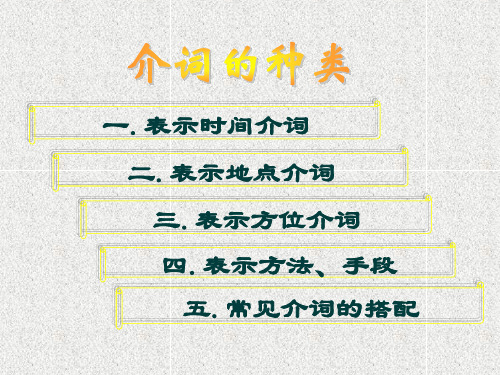
8.in a read coat, the girl in yellow, the boy in white…
3. in English , in French , in your own words, in three language… ____使_用_语__言_用__介_词__in_______
4. in a loud voice, in a low voice… ___使__用_声_音__用_介_词__i_n_____
A. on, over B.above, on C.over, on 5.The sun rose ___the horizon(地平线).
A. on B. above C.over 注意: on 接触平面
over 在平面的正上方 above 在上方
3. in + 大地方 at + 小地 方 on +门牌,某层楼
in space…
____表__示__大__地__方__用__i_n______
❖ 3. in the box, on the chair, under the desk, next to Kate, on the right of Lucy, in front of the house, behind the door…
介词:通常用在____代_词____、___名_词___、__动_名__词__
之前,表示某个人、事物/东西、事件与 另一个之间的___关__系____。
初中英语介词归纳

初中英语介词归纳介词在英语中起着非常重要的作用,它们表示名词、代词与其他词之间的关系。
对于初中生来说,掌握介词的用法是英语学习的重要一步。
本文将对初中英语中常见的介词进行归纳和解释,帮助学生更好地理解和运用介词。
一、表示位置的介词1.at:表示一个具体的点或位置。
例如:at home(在家),at school(在学校)。
2.in:表示在一个范围或区域之内。
例如:in the city(在城市里),in the classroom(在教室里)。
3.on:表示在某个物体的表面之上。
例如:on the table(在桌子上),on the wall(在墙上)。
二、表示时间的介词1.at:用于表示具体的时间点。
例如:at seven o’clock(在七点),at noon(在中午)。
2.on:用于表示具体的某一天或某一天的上午、下午、晚上。
例如:on Monday(在周一),on the morning of July 1st(在七月一日的上午)。
3.in:用于表示一段时间,如年、月、季节等。
例如:in 2023(在2023年),in spring(在春天)。
三、表示方式的介词1.by:表示通过某种方式或手段。
例如:by bus(乘公交车),by email(通过电子邮件)。
2.with:表示使用某种工具或伴随某种情况。
例如:write with a pen(用钢笔写),with pleasure(很高兴地)。
四、其他常用介词1.about:表示关于某个话题或大约的数量。
例如:talk about(谈论),about ten books(大约十本书)。
2.after:表示在某个时间或事件之后。
例如:after school(放学后),after dinner(晚饭后)。
3.before:表示在某个时间或事件之前。
例如:before breakfast(早餐前),before class(课前)。
4.under:表示在某个物体的下方。
初中英语语法讲解——介词
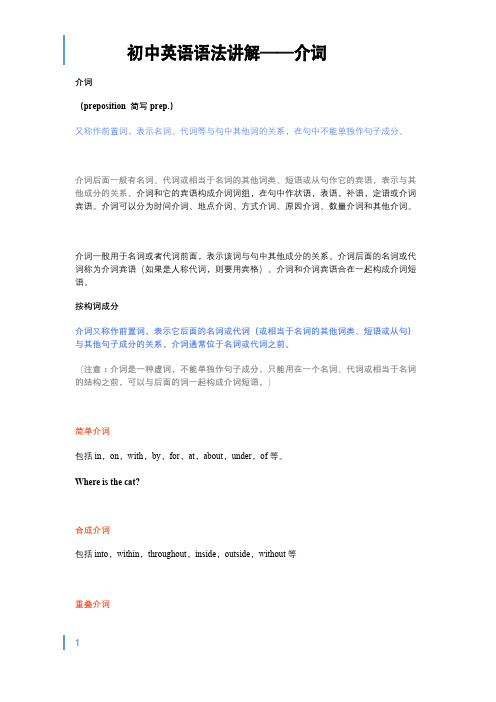
初中英语语法讲解——介词介词(preposition 简写prep.)又称作前置词,表示名词、代词等与句中其他词的关系,在句中不能单独作句子成分。
介词后面一般有名词、代词或相当于名词的其他词类、短语或从句作它的宾语,表示与其他成分的关系。
介词和它的宾语构成介词词组,在句中作状语,表语,补语,定语或介词宾语。
介词可以分为时间介词、地点介词、方式介词、原因介词、数量介词和其他介词。
介词一般用于名词或者代词前面,表示该词与句中其他成分的关系。
介词后面的名词或代词称为介词宾语(如果是人称代词,则要用宾格)。
介词和介词宾语合在一起构成介词短语。
按构词成分介词又称作前置词,表示它后面的名词或代词(或相当于名词的其他词类、短语或从句)与其他句子成分的关系。
介词通常位于名词或代词之前。
(注意:介词是一种虚词,不能单独作句子成分,只能用在一个名词、代词或相当于名词的结构之前,可以与后面的词一起构成介词短语。
)简单介词包括in,on,with,by,for,at,about,under,of等。
Where is the cat?合成介词包括into,within,throughout,inside,outside,without等重叠介词from among 从...当中from behind 从...后面,until after 直至...之后,at about 在大约...,after about 在大约...之后等短语介词一个或两个简单介词和一个或几个其他词类构成一个短语,作用相当于一个介词,这就叫做短语介词。
这类介词的末尾总是一个简单介词如according to,because of,by means of,in addition to,in front of,in spite of,into等。
分词介词有极少数介词的词尾是“-ing”,形似现在分词(其中也有些可做分词)。
常用的有:considering,regarding,respecting,including。
- 1、下载文档前请自行甄别文档内容的完整性,平台不提供额外的编辑、内容补充、找答案等附加服务。
- 2、"仅部分预览"的文档,不可在线预览部分如存在完整性等问题,可反馈申请退款(可完整预览的文档不适用该条件!)。
- 3、如文档侵犯您的权益,请联系客服反馈,我们会尽快为您处理(人工客服工作时间:9:00-18:30)。
初中介词讲解课标要求了解及掌握介词的基本用法,能够辨别介词词组的意义与区别,并且,要求学生可以在具体的语言环境中准确运用介词的用法。
一,考纲要求1、掌握常见介词的基本用法,如表示时间,方位,方式的介词的基本用法2、介词构成短语的意义,用法,及意义的区别。
2、命题趋势:介词的基本用法中的表示时间的介词;介词短语的固定搭配在选择题,完型题中的考查。
二,考点表示时间,地点及方式的介词基本用法;基本固定介词短语的用法,及易混词组的区分。
三,介词知识精讲1、概念介词(虚词),不能在句子中独立充当成分。
它总是用于名词、代词、或相当于名词的其它词类或短语活从句前。
中考需要掌握的11 个介词:in、on、at、to、from、by、with、for、about、after、before 表示时间的介词。
2、介词的句法功能A、作定语:The book on the table is mine、B、作状语:We have breakfast at seven、(表时间);They were late for meeting because of the heavy rain(表原因); They started the machine by pressing the button、(表方法)C、作表语:My dictionary is in the bag、D、作宾语补足语:I found him in the office、3、介词基本用法A、表示时间的介词in表示年、季节、月份、周,或泛指上午、下午或晚上;on表示某一天,某一天的上午、下午或晚上;at表示某一时刻或时间上的某一点。
at表示具体“钟点”时间at seven oclockat half past twoon主要用于具体的某一天或某一天的上午、下午或晚上,还用于具有某种特征的一天。
on Mondayon August8th,全文结束》》on the night of National Dayon a rainy eveningin用于世纪、年、季节、月in the21st century / in全文结束》》in spring / in January表示在一段时间以后in a week(一周以后)固定用法in the morning / afternoon / eveningAt noon; at nightat noon / night / midnightin 的第二种用法。
表示“在一段时间以后”:in,after 两者区别:I will come back in a week、我一周后将回来。
I came back after a week、我一周后回来了。
“in+时间段”表示将来时(用在表示将来时的句子中);“after+ 时间段”表示过去时(用在表示一般过去时态的句子中)。
例题:“What do think Joe will be _____ five years?” “He will be a policeman、”B、表示方位的介词表位置时:in “在、、、、、、内/里面” in the desk___________on意为 “在……的上面”; on the desk_____________ “在两边”、“在左边/右边” on theright/left ____________在树上in the tree 逗留在树上的鸟,人等 on the tree 生长在树上的叶子,果实等在墙上 in the wall 窗户,钉子,洞孔等嵌入墙内的东西 on the wall 地图,画像等悬挂,张贴在墙上的东西在报上 in the newspaper 印刷在报纸上的内容 on the newspaper 放在报纸上的东西,眼睛、书等 over意为“在……(垂直)的正上方”;above意为“在……(不一定垂直)的上方”;1、都可表示“高于”,over 主要表示垂直在上的正上方,而 above 则不一定表示正上方。
2、均可表示数目、数量等的“多于”、“超过”、“……以上”。
指数量时,over(=morethan)表示“超过” above(=higher than)指上下垂直的度量以及海拔高度e、g:Youhavetobeover18toseethisfilm、你得超过八岁才能看这部电影。
Themountainisover(morethan)4,000metresabove(higherthan)se alevel、那座山海拔有四千多米高。
3、若含有动态或覆盖的意味,通常用 over,而不用above。
S heputhercoatoverthesleepingbaby、她把大衣盖在那正在睡觉的孩子身上。
T here’saclothoverthetable、桌上摊着一块台布。
S heputherhandsoverherface、她用手遮住脸。
u nder意为“在……(垂直的)正下方”;e、g、 under the chair ____________below意为“在……(不一定垂直)的下方”;低于e、g、 temperature will fall below zero_____________________-over-under;above-below near意为“在……附近”;next to意为“紧挨着……”;round / around 意为“在……周围”;by意为“在……旁边”(stand by);表地点:in 在范围较大的地方; at 在范围较小的地方study_____ home; arrive______ Beijing; _____ the bus stop; 表示两者的位置关系时:in表示“在同一区域内或同一范围内”; on表示“接壤;相邻”; to表示“相离;相隔”,两者不属同一范围,也不接壤。
Taiwan is in the east of China、________________________________India is on the south of China、_________________________________Japan is to the east of China、___________________________________介词意义例句on在……上His book is on the desk、under在……下The football is under the chair、in在……里There is a pencil case in the schoolbag、in front of在……前Thereis a tree in front of the house、behind在……后He isstanding behind me、beside在……旁边Tom is sittingbeside the window、C、表示延续时间的介词by意为“在……之前;不迟于……”;for意为“历时……之久;持续……”;in意为“在……以后;在……时间内”;since意为“自从……以来;自……以后”;until用于否定句中,意为“直到……才”,(not、、、until)用在肯定句中,意为“直到……为止”a)他已经当老师9年了。
He has been a teacher ________nine years、b)我已经在这儿住了10年了。
I have lived here ________ten years ago、c)他分钟之后将会回来。
He will be back ________ ten minutes、d)直到五月,我们才会看到一些花。
We don’t see anyflowers ________ May、e)你必须得在这里站到太阳落下去为止。
You must stand here ________ the sun sets、f)我明天早晨八点前必须得到校。
I must be at school________ eight tomorrow morning、g)你能在五分钟之内干完这些工作吗?Can you finish your work _______ five minutes?D、表示方式的介词介词用来表交通,常把by, in, on来用;by要直通海陆空,限定、复数用in / on;骑马、骑车惯用on,小轿车前in才通。
【注】1、by + 交通工具,意为“乘坐……”。
如:海:be ship / boat / sea 陆:by bus / car / train / bike / taxi 空:by air / plane / spaceship2、 on / in + 限定词 + 交通工具,意为“乘坐……”。
(交通工具前面有the,one’s等限定词时,介词不能用by,用in或者on)e、g、He goes to work on the bike / in hiscar/on the train/on his mother’s bike、他骑自行车 / 开车/坐火车/ 骑他妈妈的自行车去上班。
3、 on foot为固定短语,意为“步行”。
E、表示运动方向的介词across意为“从……表面穿过”,或沿某一条线的方向而进行的动作;through意为“从……内部穿过”;past和by表示“从旁边经过或路过”。
如:Please be careful when you go ________ the street、Look! The mosquito is trying to fly ________ the window、We often go ________ a bakery on our way to school、F: 介词练习题:1、He kept his head _____ water when he began to learn swimming, but he raised his head now and thenB、 belowC、 aboveD、 up2、 Another grand bridge will be built _____ the Pearl River in our city、A、 alongB、 upC、 onD、 across3、 Ill leave Beijing for Guangzhou ____ a week, while my brother will leave Guangzhou for Beijing ____ our National Day、A、 in, inB、 after, inC、 after, afterD、 in, after4、 The huge picture looks more beautiful _____ the blue sky、A、 againstB、 toC、 over5、 The climate here doesnt agree _____ her、A、 toB、 onC、 withD、 at6、 Standard time in Beijing is eight hours ____ Greenwich Mean Time(GMT格林威治标准时间)、A、 afterB、 frontC、 ahead ofD、 forward7、- Can you t ell me what’s your aim in life, Li Ping?--- I am aiming ____ a famous physicist、A、 atB、 forC、 inD、 to8、 "Pass ____ the bus, everyone、" the conductor shouted politely、A、 onB、 intoD、 along9、 I was angry _____ missing the gongfu film with Cheng Long as hero、A、 atB、 withC、 forD、 on10、 We were anxious _____ news of your safearrival、A、 toB、 ofC、 forD、 at11、Tom was arguing _____ the payment of the bill_____ John、A、 about; onB、 over; withC、 on; onD、 with; with12、 They were astonished _____ the news of his escape from prison、B、 inC、 atD、 to13、He was absorbed ____ a book and didn’t hear your repeated call、A、 toB、 inC、 withD、 at14、- Are you familiar with the bank over there?--- Only a little, I have an account ____ it、A、 inB、 withC、 toD、 of15、 The doctor bent _____ the boy and checked his wound、A、 upB、 onC、 aboveD、 over16、 Mary answered all the questions _____ the last one, which she had never heard of before、A、 besidesB、 exceptC、 apart fromD、 except for17、 Hunan lies _____ such provinces as Hubei, Jiangxi, Guangdong, Guizhou and Chongqin、A、 amongB、 aboveC、 besideD、 between18、 The dying man is _____ the help of the doctor、A、 outsideB、 withoutC、 out ofD、 beyond19、I don’t know why he blamed the accident _____ me、A、 atB、 toC、 forD、 on20、 The horse is blind _____ the left eye、A、 toB、 inC、 forD、 on21、He is very strict with others, but he is always blind _____ his own shortcomings、A、 forB、 toC、 withD、 in22、 We will never forget this historical lesson written _____ blood、A、 byB、 withC、 ofD、 in23、 It is said that a bridge is being built _____ the river、A、 underB、 toD、 at24、- How did you go to work yesterday?--- I went to w ork _____ my friend’s private car、A、 byB、 inC、 onD、 at25、 The train leaves at6:00 p、m、, so I have to be at the station ____5:40 p、m、 at the least、A、 untilB、 afterC、 byD、 around26、 I called _____ you last night, but you were out、A、 withB、 onC、 atD、 in27、 You should write the first letter of the sentence _____ capital one、B、 withC、 inD、 at28、 He is too careful _____ his money; he never buysa drink for us、A、 toB、 atC、 forD、 with29、 Can you say _____ certain when he will come here?A、 atB、 forC、 withD、 in30、 More than20 years ago he was badly wounded inthe anti-Vietnam war、 Since then he can only walk _____ an arm-chair 、A、 inB、 onC、 byD、 over31、Einstein didn’t care for money、 Once he used a check _____ $1000 as a bookmark and then he lost it、A、 forB、 ofC、 aboutD、 to32、 When the Chinese delegation arrived at Vienna airport, they were received _____ cheers、A、 inB、 forC、 onD、 with33、 The little boy is very clever _____ every subject、A、 atB、 inC、 aboutD、 on34、 Her clothes are very bright _____ colour、A、 ofB、 inC、 onD、 with35、Don’t sit _____the corner of the desk、That’s impolite for a student、A、 onB、 inC、 toD、 at36、 It is said that the step-mother is very cruel_____ the children、A、 withB、 atC、 aboutD、 to37、 The boy is curious _____ everything、 I am sure he is very clever、A、 toB、 aboutC、 withD、 in38、 She is crazy _____ the film star, while her brother is crazy _____ surfing、A、 to; forC、 for; atD、 for; on39、 Once everyone is _____ his life, he will instinctively(本能)find every possible way _____、A、 in danger of; out of dangerB、 in the danger of; out of dangerC、 in danger of; out of the dangerD、 in the danger of; out of the danger40、Let’s put our heads together and decide _____ a plan of action、A、 onB、 aboutC、 forD、 at41、During her study in Massachusetts Institute of Technology she has got the degree _____ PhD, and it is a degree ______ chemistry、A、 of; atB、 in; atC、 of; in42、 In China children, even in their twenties depended _____ their parents _____ food and clothing、A、 upon; onB、 on; inC、 on; forD、 at; to43、 Our national scenery Zhangjiajie is so charming that it is _____ description、A、 outB、 besideC、 overD、 beyond44、 _____ the _____ of modern industry, the pollution is becoming more and more serious、A、 With; developingB、 Under; developmentC、 With; developmentD、 Under; developing45、 The twins look much like each other, but they are different _____ nature、A、 inB、 aboutC、 onD、 with46、 _____ his disadvantage, it began to rain heavily suddenly、A、 AtB、 WithC、 ToD、 For47、 She was disappointed _____ hearing the news that Chinese football team lost the first match in “Wor ld Cup”、A、 atB、 inC、 ofD、 with48、 Some new changes happened _____ the school _____ my absence、A、 at; toB、 in; forC、 in; duringD、 at; on49、 He goes _____ at8 a、m、 and comes _____ at5 p、m、 Today he is _____、A、 on duty; off duty; on night dutyB、 on his duty; off the duty; on night dutyC、 to duty; from duty; at night dutyD、 in duty; out duty; at night duty50、 The Englishman has a very good ear _____ music、You can ask him for some advice、A、 atB、 ofC、 forD、 inG、教法提示常用介词用法歌诀in在里面on在上,by 和beside在近旁;above表示在上方,below恰好为反向。
